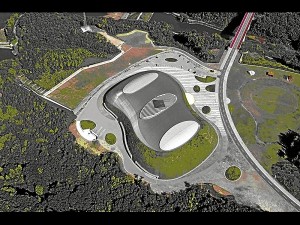
THIS REGIONAL Disaster Management Park in Miki, near Kobe, Japan, encased in a stainless steel shell, mostly covered with grass, combines as tennis dome and emergency center. panoramio.com
Global procrastination. This is what Al Gore, former US Vice President, had to say about the world’s inability and inaction to address and combat climate change in his book, “Our Choice—A Plan to Solve the Climate Crisis.”
Al Gore is right. As the world continues putting 30 billion tons of carbon dioxide into the atmosphere every year, we continue to experience more severe and erratic weather conditions such as floods, drought and rising sea levels.
And for the Philippines, which ranks third in the list of countries most vulnerable to climate change, this means more destructive typhoons.
Mitigation strategies
Various experts are offering strategies to mitigate climate change ranging from an update of the comprehensive land use plan to a massive reforestation program and managing the safety of dams.
While we believe these are all effective strategies, our biggest priority right now is coping and managing people and resources during climate change-related disasters, including fire and earthquakes.
Green open spaces
One idea is to divide in urban areas, especially high-risk areas, into small districts with green open spaces. These spaces will provide access to fire-fighting equipment and to people evacuating the area.
These green spaces can serve as temporary evacuation areas and also passage for fire trucks, ambulances and rescue operations vehicles. Providing these spaces can lessen the chaos that follows during disaster when people are at a loss as to where to evacuate.
Disaster-prone cities now build permanent or semipermanent disaster control or management buildings. They can be designed and used as a sports stadium, or recreational domes that are meant to be regional relief centers readily accessible to displaced persons, supply trucks and even helicopters.
These multipurpose facilities have toilets with efficient shower and dressing areas, cooking and dining areas.
The building or compound can be controlled by a command post that can monitor rescue operations, movement of the typhoon, manage the influx of evacuees and the goods needed for the operation of the entire facilities.
Green center
Since power interruption happens during major typhoons, the center will have photo voltaic panels to provide power for the command post’s communication equipment, computers and common areas.
An inexpensive disaster management plan in case of earthquake will enable communities to take periodic stock of vacant lots as escape routes for inhabitants. Fires usually follow earthquakes, and many cities in Japan widen narrow roads to create fire breaks.
The twentieth century was characterized by so much expansion and growth. The twenty-first century will be characterized by contraction due to environmental degradation and depopulation. One-third of all nations now have birth rates that are unable to maintain their population.
Our generation’s exponential pursuit of material goods has ravaged our natural resources and caused high carbon emissions.
For comments or inquiries, e-mail amadodejesus@gmail.com.

